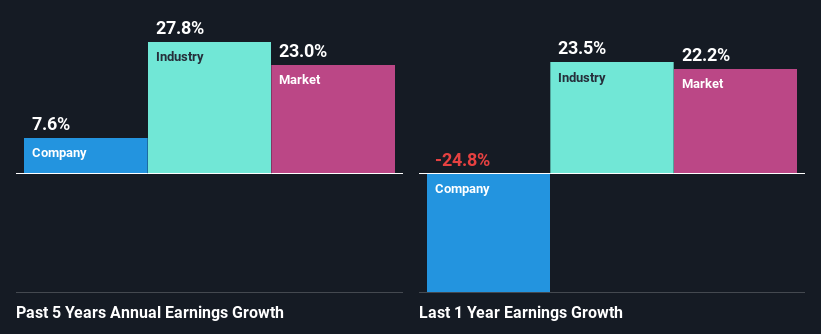Rishabh Instruments (NSE:RISHABH) has had a rough three months with its share price down 11%. However, stock prices are usually driven by a company’s financials over the long term, which in this case look pretty respectable. Specifically, we decided to study Rishabh Instruments’ ROE in this article.
ROE or return on equity is a useful tool to assess how effectively a company can generate returns on the investment it received from its shareholders. In simpler terms, it measures the profitability of a company in relation to shareholder’s equity.
See our latest analysis for Rishabh Instruments
How Do You Calculate Return On Equity?
The formula for return on equity is:
Return on Equity = Net Profit (from continuing operations) ÷ Shareholders’ Equity
So, based on the above formula, the ROE for Rishabh Instruments is:
6.2% = ₹350m ÷ ₹5.6b (Based on the trailing twelve months to June 2024).
The ‘return’ is the amount earned after tax over the last twelve months. One way to conceptualize this is that for each ₹1 of shareholders’ capital it has, the company made ₹0.06 in profit.
What Is The Relationship Between ROE And Earnings Growth?
Thus far, we have learned that ROE measures how efficiently a company is generating its profits. Depending on how much of these profits the company reinvests or “retains”, and how effectively it does so, we are then able to assess a company’s earnings growth potential. Assuming everything else remains unchanged, the higher the ROE and profit retention, the higher the growth rate of a company compared to companies that don’t necessarily bear these characteristics.
Rishabh Instruments’ Earnings Growth And 6.2% ROE
As you can see, Rishabh Instruments’ ROE looks pretty weak. Even when compared to the industry average of 10%, the ROE figure is pretty disappointing. Although, we can see that Rishabh Instruments saw a modest net income growth of 7.6% over the past five years. We believe that there might be other aspects that are positively influencing the company’s earnings growth. Such as – high earnings retention or an efficient management in place.
Next, on comparing with the industry net income growth, we found that Rishabh Instruments’ reported growth was lower than the industry growth of 28% over the last few years, which is not something we like to see.

Earnings growth is an important metric to consider when valuing a stock. It’s important for an investor to know whether the market has priced in the company’s expected earnings growth (or decline). By doing so, they will have an idea if the stock is headed into clear blue waters or if swampy waters await. One good indicator of expected earnings growth is the P/E ratio which determines the price the market is willing to pay for a stock based on its earnings prospects. So, you may want to check if Rishabh Instruments is trading on a high P/E or a low P/E, relative to its industry.
Is Rishabh Instruments Using Its Retained Earnings Effectively?
Rishabh Instruments doesn’t pay any regular dividends currently which essentially means that it has been reinvesting all of its profits into the business. This definitely contributes to the decent earnings growth number that we discussed above.
Summary
In total, it does look like Rishabh Instruments has some positive aspects to its business. That is, a decent growth in earnings backed by a high rate of reinvestment. However, we do feel that that earnings growth could have been higher if the business were to improve on the low ROE rate. Especially given how the company is reinvesting a huge chunk of its profits. While we won’t completely dismiss the company, what we would do, is try to ascertain how risky the business is to make a more informed decision around the company. Our risks dashboard will have the 1 risk we have identified for Rishabh Instruments.
New: AI Stock Screener & Alerts
Our new AI Stock Screener scans the market every day to uncover opportunities.
• Dividend Powerhouses (3%+ Yield)
• Undervalued Small Caps with Insider Buying
• High growth Tech and AI Companies
Or build your own from over 50 metrics.
Have feedback on this article? Concerned about the content? Get in touch with us directly. Alternatively, email editorial-team (at) simplywallst.com.
This article by Simply Wall St is general in nature. We provide commentary based on historical data and analyst forecasts only using an unbiased methodology and our articles are not intended to be financial advice. It does not constitute a recommendation to buy or sell any stock, and does not take account of your objectives, or your financial situation. We aim to bring you long-term focused analysis driven by fundamental data. Note that our analysis may not factor in the latest price-sensitive company announcements or qualitative material. Simply Wall St has no position in any stocks mentioned.

















